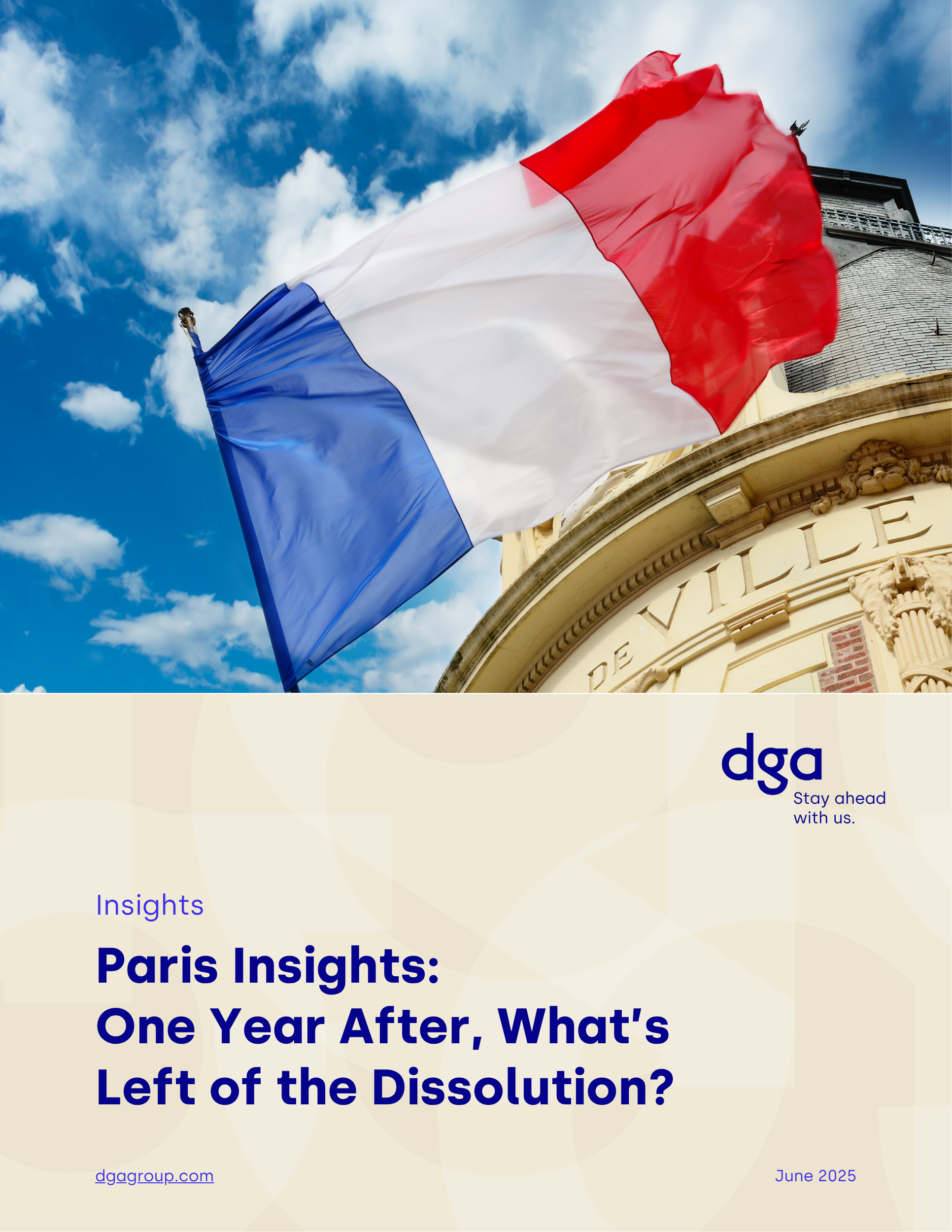Paris Insights: One Year After, What’s Left of the Dissolution?

Paris Insights – One year anniversary of Macron’s gambit
One year ago, after his camp was heavily defeated at the European elections (losing by more than 10 points to the far-right party Rassemblement National), President Emmanuel Macron decided it was time to shake things up. Surprising everyone, he announced on the same night of the defeat that he was dissolving the National Assembly, calling for general elections in July 2024.
As we reach the one-year anniversary of Macron’s gambit, let’s take a look at its impact, whether it worked or not, and what’s next for France in a still-unstable political environment.
An unprecedented decision motivated by a stifling defeat
The first dissolution since 1997 came in a very specific political context: Macron had been dealing with a fragmented National Assembly for two years, since his re-election in 2022. His absolute majority from his first term (2017 – 2022) was only a distant memory. However, his Prime Ministers had been successful in passing bills, including the much-criticized Pensions bill in 2023. His camp was in no way the favorite for the June 2024 European elections, yet he still believed in his chance to reduce the gap with Jordan Bardella’s Rassemblement National.
Given the scale of Macron’s defeat, he felt compelled to call for another election in the hopes it would strengthen his position at a national level.
To this day, the decision remains widely unpopular
The dissolution and the general elections that followed did not bring Macron’s desired clarity. Three political blocks emerged without any kind of majority between them: the far-right improved dramatically and the left-wing managed to unite itself in a record three weeks. In this new configuration, the first Prime Minister, Michel Barnier, only lasted for four months and fell during the Budget Bill. The current Prime Minister, François Bayrou, has managed to defeat several motions of no confidence, but his path for the next months will not be easy.
Most of the French people (81% according to a recent IFOP poll) believe that the dissolution wasted France’s time in a context of international turmoil. Seventy-four percent of the French people also think that this decision prevented the government from taking much-needed reforms.
Only the French President still seems to believe it was a good idea. In December, while addressing the French citizens, he seemed to acknowledge a mistake for the first time, commenting “The dissolution has, for the moment, brought more divisions to the Assembly than solutions for the French people.” However, privately, he said that it will pay off “in the long term” and that already some “positive impacts” can be seen, such as the Rassemblement National image taking a hit.
A period of uncertainty for the foreseeable future
In less than four weeks, Macron will be able to dissolve the National Assembly again, which would lead to another general election. He has said on record that he does not intend to use it as of now, instead calling for the left-wing and right-wing parties to find a way to work together.
“In all the democracies around us, political parties that do not have a majority learn to work together to build action. That is what we must do,” Macron said. He also implied that he was not afraid to push the button, criticizing the current path chosen by the government and the Parliament as he’s said “the solution for the country is not to unravel ecology, nor to unravel the economy.”
The opposition, especially the far-left wing and the far-right wing, are also increasingly discussing censorship. With the budget presentation expected before July 14 and major budgetary challenges coming (public deficit, with the objective of bringing it down to 5,4% in 2025; debates around increasing VAT; and the state of social security accounts), the current Prime Minister will have to find the right balance in an uncertain political environment. Macron, after a small surge in ratings due to his international action, is losing momentum every day as most of the focus is shifting to 2027 and the next Presidential election. One thing is clear one year after Macron’s bet: France is navigating troubled waters, and the dissolution was in no way a clarification.
About DGA Group
DGA Group is a global advisory firm that helps clients protect – and grow – what they have built in today’s complex business environment. We understand the challenges and opportunities in an increasingly regulated and interconnected world. Leveraging the expertise and experience of our team at Albright Stonebridge Group, a leader in global strategy and commercial diplomacy, and a deep bench of communications, public affairs, government relations and business intelligence consultants, we help clients navigate and shape global policy, reputational and financial issues. To learn more, visit dgagroup.com.
For additional information or to arrange a follow-up, please contact Erwann.LePage@dgagroup.com.